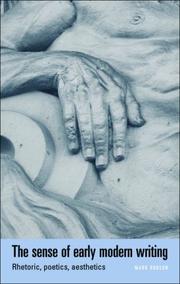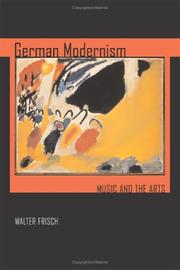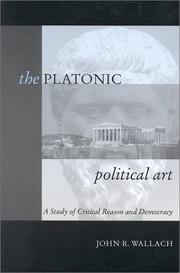| Listing 1 - 4 of 4 |
Sort by
|

ISBN: 9781526130631 1526130637 9780719069468 9780719069475 Year: 2018 Publisher: Manchester Manchester University Press
Abstract | Keywords | Export | Availability | Bookmark
 Loading...
Loading...Choose an application
- Reference Manager
- EndNote
- RefWorks (Direct export to RefWorks)
In The Sense of Early Modern Writing, Mark Robson pursues the relation between the concept of the 'early modern' and modernity, tracing the complex interactions of post-Romantic, philosophical aesthetics and early modern rhetoric and poetics. The book therefore questions the status of what we now think of as literary texts in a period prior to the emergence of literature as a category.
Aesthetics --- Rhetoric, Renaissance. --- European literature --- Renaissance rhetoric --- Radio broadcasting Aesthetics --- History. --- History and criticism. --- Literature --- Literary Studies: C 1500 To C 1800 --- LITERARY CRITICISM / European / English, Irish, Scottish, Welsh --- Ireland --- aesthetics. --- early modern writing. --- historicist. --- influential narrative. --- literary studies. --- modernity. --- poetics. --- reading. --- rhetoric. --- sense.

ISBN: 1282360264 1423727606 9786612360268 0520940806 1598757849 9780520940802 9781423727606 9780520243019 0520243013 9781598757842 9781282360266 9780520251489 0520251482 6612360267 Year: 2005 Publisher: Berkeley University of California Press
Abstract | Keywords | Export | Availability | Bookmark
 Loading...
Loading...Choose an application
- Reference Manager
- EndNote
- RefWorks (Direct export to RefWorks)
In this pioneering, erudite study of a pivotal era in the arts, Walter Frisch examines music and its relationship to early modernism in the Austro-German sphere. Seeking to explore the period on its own terms, Frisch questions the common assumption that works created from the later 1870's through World War I were transitional between late romanticism and high modernism. Drawing on a wide range of examples across different media, he establishes a cultural and intellectual context for late Richard Wagner, Richard Strauss, Gustav Mahler, and Arnold Schoenberg, as well as their less familiar contemporaries Eugen d'Albert, Hans Pfitzner, Max Reger, Max von Schillings, and Franz Schreker. Frisch explores "ambivalent" modernism in the last quarter of the nineteenth century as reflected in the attitudes of, and relationship between, Nietzsche and Wagner. He goes on to examine how naturalism, the first self-conscious movement of German modernism, intersected with musical values and practices of the day. He proposes convergences between music and the visual arts in the works of Brahms, Max Klinger, Schoenberg, and Kandinsky. Frisch also explains how, near the turn of the century, composers drew inspiration and techniques from music of the past-the Renaissance, Bach, Mozart, and Wagner. Finally, he demonstrates how irony became a key strategy in the novels and novellas of Thomas Mann, the symphonies of Mahler, and the operas of Strauss and Hofmannsthal.
Art and music. --- Modernism (Art) --- Modernism (Music) --- Music --- Modernism in music --- Modernist music --- Musical modernism --- Style, Musical --- Art, Modernist --- Modern art --- Modernism in art --- Modernist art --- Aesthetic movement (Art) --- Art, Modern --- Music and art --- History and criticism. --- Musique --- Modernisme (musique) --- Modernisme (art) --- Art et musique. --- 19th century european music. --- 20th century european music. --- ambivalent modernism. --- arnold schoenberg. --- austro german music. --- california studies in 20th century music. --- early modernism. --- eugen dalbert. --- franz schreker. --- german modernism. --- german naturalism. --- gustav mahler. --- hans pfitzner. --- historicist modernism. --- late richard wagner. --- max reger. --- max von schillings. --- modernism. --- modernist music. --- modernity. --- music and visual arts. --- music history. --- music. --- musicians. --- nietzsche. --- richard strauss. --- thomas mann. --- wagner.

ISBN: 0271031026 9780271031026 9780271054322 0271054328 9780271052663 027105266X 027102075X 0271020768 9780271020761 9780271050010 9780271020754 0271076798 Year: 2015 Publisher: University Park, PA
Abstract | Keywords | Export | Availability | Bookmark
 Loading...
Loading...Choose an application
- Reference Manager
- EndNote
- RefWorks (Direct export to RefWorks)
In this first comprehensive treatment of Plato’s political thought in a long time, John Wallach offers a ";critical historicist"; interpretation of Plato. Wallach shows how Plato’s theory, while a radical critique of the conventional ethical and political practice of his own era, can be seen as having the potential for contributing to democratic discourse about ethics and politics today.The author argues that Plato articulates and ";solves"; his Socratic Problem in his various dialogues in different but potentially complementary ways. The book effectively extracts Plato from the straightjacket of Platonism and from the interpretive perspectives of the past fifty years—principally those of Karl Popper, Leo Strauss, Hannah Arendt, M. I. Finley, Jacques Derrida, and Gregory Vlastos.The author’s distinctive approach for understanding Plato—and, he argues, for the history of political theory in general—can inform contemporary theorizing about democracy, opening pathways for criticizing democracy on behalf of virtue, justice, and democracy itself.
Plato --- Plato. --- Platon --- Aflāṭūn --- Aplaton --- Bolatu --- Platonas --- Platone --- Po-la-tʻu --- Pʻŭllatʻo --- Pʻŭllatʻon --- Pʻuratʻon --- Πλάτων --- אפלטון --- פלאטא --- פלאטאן --- פלאטו --- أفلاطون --- 柏拉圖 --- 플라톤 --- Платон --- プラトン --- Contributions in poltical science. --- Views on democracy. --- Democracy. --- Reason. --- PHILOSOPHY / History & Surveys / Ancient & Classical. --- 0-271-02075-x. --- Gregory Vlastos. --- Hannah Arendt. --- Jacques Derrida. --- John R. Wallach. --- Karl Popper. --- Leo Strauss. --- M.I. Finley. --- Platonism. --- Political Philosophy. --- Socratic Problem. --- Theory. --- conventional ethical. --- critical historicist. --- democratic discourse. --- ethics. --- justice. --- political practice. --- politics. --- radical critique. --- virtue. --- Self-government --- Political science --- Equality --- Representative government and representation --- Republics --- Mind --- Intellect --- Rationalism
Book
ISBN: 1784996793 9781784996796 9780719090226 0719090229 9781784996178 1784996173 Year: 2016 Publisher: Manchester
Abstract | Keywords | Export | Availability | Bookmark
 Loading...
Loading...Choose an application
- Reference Manager
- EndNote
- RefWorks (Direct export to RefWorks)
This collection of essays explores medieval and early modern Troilus-texts from Chaucer to Shakespeare. The contributions show how medieval and early modern fictions of Troy use love and other emotions as a means of approaching the problem of tradition. As these texts reflect on their own traditionality, they highlight both the affective nature of temporality and the role of affect in scrutinising tradition itself. Focusing on a specific textual lineage that bridges the conventional period boundaries, the collection participates in an exchange between medievalists and early modernists that seeks to generate a dialogic encounter between the periods with the aim of further dismantling the rigid notions of chronology and periodisation that have kept medieval and early modern scholarship apart.
Love in literature. --- Emotions in literature. --- English literature --- History and criticism. --- Shakespeare, William, --- Chaucer, Geoffrey, --- Geschichte --- Liebe --- Chaucer, Geoffrey. --- Shakespeare, William --- Troilus and Criseyde (Chaucer, Geoffrey) --- Troilus and Cressida (Shakespeare, William) --- William Shakespeare's Troilus and Cressida (Shakespeare, William) --- History of Troilus and Cressida (Shakespeare, William) --- Tragedie of Troylus and Cressida (Shakespeare, William) --- Troilus & Criseyde (Chaucer, Geoffrey) --- Pierpont Morgan Library (Chaucer, Geoffrey) --- Troilus and Cressida (Chaucer, Geoffrey) --- Chaucer. --- New Historicist paradigm. --- Shakespeare. --- Troilus and Criseyde. --- anticipatory emotion. --- authorial humility. --- early modern fiction. --- emotion. --- gendered female. --- hermeneutical acts. --- late medieval Troy tradition. --- literary combat. --- literary narratives. --- literary studies. --- medieval fiction. --- military combat. --- sententiousness. --- sexual frustration. --- temporality. --- tradition.
| Listing 1 - 4 of 4 |
Sort by
|

 Search
Search Feedback
Feedback About UniCat
About UniCat  Help
Help News
News